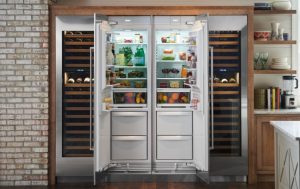4 Home Appliances the Consume the Most Energy

Whenever a new energy bill arrives, it’s a daunting moment, and many of us wonder if it will be higher or lower than last month. Although the prices of energy have increased in recent years, there are other factors that we have at least some control over. In this article, we will look at the top four energy using appliances and some ways to make them more energy efficient to save money.
- The Washer and Dryer
We all need to clean our dirty clothes, and this makes a washer and dryer a necessary expense. It’s estimated that the average home energy cost for home laundry is $143 annually. Doing your laundry at home costs less when you consider traveling times to and from the laundromat. But, it is possible to reduce that annual laundry energy bill if you wash your clothes in a smarter way.
The primary reason for energy use when washing clothes is the heating of the water. So, if you can switch to using cold water whenever possible, this will have a significant effect on your energy use. If you have an older washer or dryer, it’s tempting to hang onto them to save money, but this may be a false economy. The modern washers and dryers are far more energy efficient compared to older units, and this will save you money in lower energy bills over the lifespan of the machines.
- The Refrigerator
The refrigerator is the second highest energy consuming appliance, and this is too surprising when you consider that it’s using energy all the time. We cannot turn the refrigerator off to save money because we need our food to stay cool. But, there are some little tips and tricks that you can use to reduce the energy needed to run your refrigerator.
The ideal refrigerator temperature is 35ºF, and every degree below that number consumes more energy than necessary. If your refrigerator is kept full, it will work better because there is less space to cool around the food. If you have a refrigerator manufactured before 1994, it will cost you more to run than an energy efficient unit.
- An Electric Oven or Range
If you use an electric oven once per day at 350ºF, you will spend around $90 annually in energy. If you enjoy cooking meals at home and you use your electric oven regularly at even higher temperatures, it can really add up over time. But, there is no need to stop cooking regularly if you make some minor changes to your cooking routine.
Heating the oven to the correct temperature uses the most energy, so it makes good sense to make the most of that energy expenditure. When you use an electric oven, try to cook more meals at the same time, so your oven doesn’t need to heat up every time. If you have a convection setting, it’s 20% more energy efficient compared to the bake setting. Another option is to switch to an electric induction cooktop that uses magnets to efficiently conduct heat to your cooking vessel. It’s estimated that this is 12% more energy efficient compared to a range or smooth top electric cooktop.
- The Dishwasher
The average home spends around $35-$49 each year on energy to run the dishwasher. This isn’t a huge amount of energy, but from 2014 new dishwasher standards for energy efficiency were established, and older models use more energy. But, the primary concern is the volume of water that a dishwasher uses, and this will drive up your utility bills.
It’s important to make the most of the energy and water used by filling the dishwasher for each and every load. The latest Energy Star dishwashers are far more efficient in terms of energy and water usage. Many models consume 12% less energy, and the volume of water is reduced by around 50%. This can really add up to significant savings over the useful lifespan of the unit.
If you’re considering upgrading your home appliances, you can explore your options with our energy efficient appliance collection or for more specialized service, speak to a home appliance expert.
- How to Design a Year-Round Outdoor Kitchen in Southern California
- What Are Flush-Mount Appliances: Flush-Mount Appliances Explained
- What Appliance Brands Hold Their Value the Longest
- Designing the Ultimate Outdoor Bar: Must-Have Appliances for Year-Round Fun
- Luxury Refrigerator Guide 2025: Built-In vs. Freestanding and What to Know Before You Buy
- How Smart Appliances Are Changing Luxury Kitchen Design in 2025
- The Ultimate Outdoor Grill Guide for 2025: Built-In vs. Freestanding
- Smart Bathroom Faucets & Fixtures in 2025: Blending Technology with Luxury Design
- Built-In Coffee Machines: Are They Worth It for Your Kitchen in 2025?
- How to Choose the Right Dishwasher for Your Home: Noise, Capacity, and Features Explained






